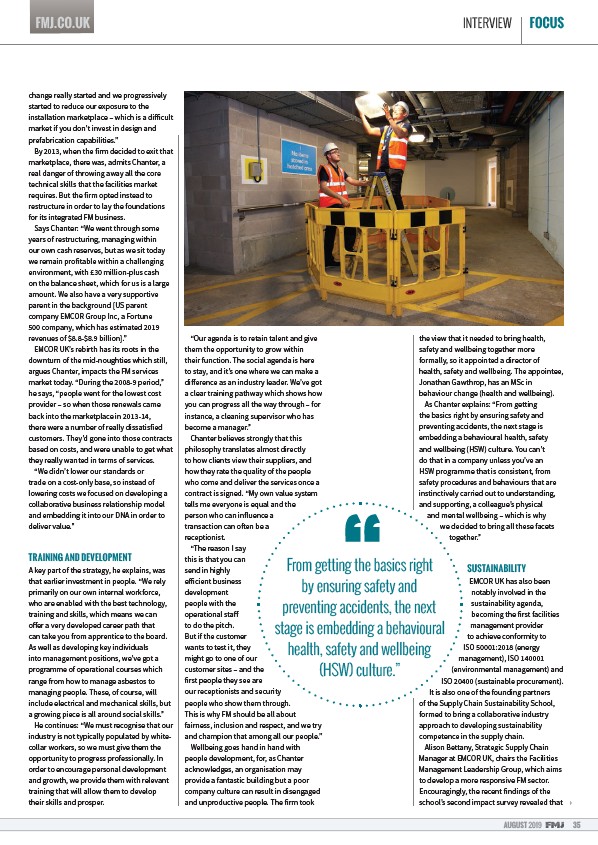
FMJ.CO.UK INTERVIEW FOCUS
AUGUST 2019 35
change really started and we progressively
started to reduce our exposure to the
installation marketplace – which is a di icult
market if you don’t invest in design and
prefabrication capabilities.”
By 2013, when the firm decided to exit that
marketplace, there was, admits Chanter, a
real danger of throwing away all the core
technical skills that the facilities market
requires. But the firm opted instead to
restructure in order to lay the foundations
for its integrated FM business.
Says Chanter: “We went through some
years of restructuring, managing within
our own cash reserves, but as we sit today
we remain profitable within a challenging
environment, with £30 million-plus cash
on the balance sheet, which for us is a large
amount. We also have a very supportive
parent in the background US parent
company EMCOR Group Inc, a Fortune
500 company, which has estimated 2019
revenues of $8.8-$8.9 billion.”
EMCOR UK’s rebirth has its roots in the
downturn of the mid-noughties which still,
argues Chanter, impacts the FM services
market today. “During the 2008-9 period,”
he says, “people went for the lowest cost
provider – so when those renewals came
back into the marketplace in 2013-14,
there were a number of really dissatisfied
customers. They’d gone into those contracts
based on costs, and were unable to get what
they really wanted in terms of services.
“We didn’t lower our standards or
trade on a cost-only base, so instead of
lowering costs we focused on developing a
collaborative business relationship model
and embedding it into our DNA in order to
deliver value.”
TRAINING AND DEVELOPMENT
A key part of the strategy, he explains, was
that earlier investment in people. “We rely
primarily on our own internal workforce,
who are enabled with the best technology,
training and skills, which means we can
o er a very developed career path that
can take you from apprentice to the board.
As well as developing key individuals
into management positions, we’ve got a
programme of operational courses which
range from how to manage asbestos to
managing people. These, of course, will
include electrical and mechanical skills, but
a growing piece is all around social skills.”
He continues: “We must recognise that our
industry is not typically populated by whitecollar
workers, so we must give them the
opportunity to progress professionally. In
order to encourage personal development
and growth, we provide them with relevant
training that will allow them to develop
their skills and prosper.
“Our agenda is to retain talent and give
them the opportunity to grow within
their function. The social agenda is here
to stay, and it’s one where we can make a
di erence as an industry leader. We’ve got
a clear training pathway which shows how
you can progress all the way through – for
instance, a cleaning supervisor who has
become a manager.”
Chanter believes strongly that this
philosophy translates almost directly
to how clients view their suppliers, and
how they rate the quality of the people
who come and deliver the services once a
contract is signed. “My own value system
tells me everyone is equal and the
person who can influence a
transaction can o‡ en be a
receptionist.
“The reason I say
this is that you can
send in highly
e icient business
development
people with the
operational sta
to do the pitch.
But if the customer
wants to test it, they
might go to one of our
customer sites – and the
first people they see are
our receptionists and security
people who show them through.
This is why FM should be all about
fairness, inclusion and respect, and we try
and champion that among all our people.”
Wellbeing goes hand in hand with
people development, for, as Chanter
acknowledges, an organisation may
provide a fantastic building but a poor
company culture can result in disengaged
and unproductive people. The firm took
the view that it needed to bring health,
safety and wellbeing together more
formally, so it appointed a director of
health, safety and wellbeing. The appointee,
Jonathan Gawthrop, has an MSc in
behaviour change (health and wellbeing).
As Chanter explains: “From getting
the basics right by ensuring safety and
preventing accidents, the next stage is
embedding a behavioural health, safety
and wellbeing (HSW) culture. You can’t
do that in a company unless you’ve an
HSW programme that is consistent, from
safety procedures and behaviours that are
instinctively carried out to understanding,
and supporting, a colleague’s physical
and mental wellbeing – which is why
we decided to bring all these facets
together.”
SUSTAINABILITY
EMCOR UK has also been
notably involved in the
sustainability agenda,
becoming the first facilities
management provider
to achieve conformity to
ISO 50001:2018 (energy
management), ISO 140001
(environmental management) and
From getting the basics right
by ensuring safety and
preventing accidents, the next
stage is embedding a behavioural
health, safety and wellbeing
ISO 20400 (sustainable procurement).
It is also one of the founding partners
of the Supply Chain Sustainability School,
formed to bring a collaborative industry
approach to developing sustainability
competence in the supply chain.
Alison Bettany, Strategic Supply Chain
Manager at EMCOR UK, chairs the Facilities
Management Leadership Group, which aims
to develop a more responsive FM sector.
Encouragingly, the recent findings of the
school’s second impact survey revealed that
(HSW) culture.”